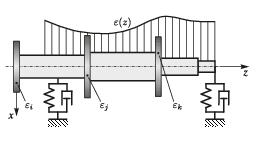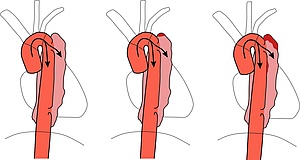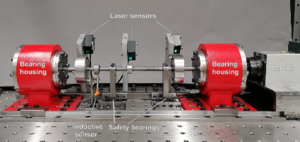
Numerical analysis of viscoelastic rotor-bearing systems
Progressive developments in the field of rotor dynamics require special consideration of viscoelastic materials. The efficient description of rotordynamic systems plays a crucial role. Therefore, classical models can no longer satisfactorily and efficiently represent many of the viscoelastic effects in rotor dynamics.
In this dissertation, a transcendental eigenvalue search algorithm is presented, characterised by high reliability and speed. The developed model can represent all rotor dynamic effects of different viscoelastic material models. In addition to a wide variety of rotors, different unbalances are also modelled. The results show that the model is accurate and resource-efficient, which is particularly advantageous for practical applications.
Duration: 01.03.2022 - ongoing
Contact person: DI Dr. Gregor Überwimmer gregor.ueberwimmer@tugraz.at

Mechanics, Modeling and Simulation of Aortic Dissection
The human body in general can be seen as an enormous source of uncertainty and complexity. Our understanding of the mechanisms behind aortic dissection and the aorta is therefore limited. Sensitivity analysis techniques reduce the unpredictability of model responses and in particular the disease mentioned above. By reducing the number of random variables in the computational phase, sensitivity analysis simplifies the diagnostic process and facilitates the development of patient-specific models. The project is being carried out as part of the GCCE, whereby several institutes are working on the modelling of aortic dissection. For further information, please refer to the project homepage.
Duration: 01.03.2018 - 01.03.2024
Contact person: Dr.techn. Gian Marco Melito gmelito@tugraz.at

Balancing of flexible rotors using the Numerical Assembly Technique
Balancing high-speed machines is one of the most demanding tasks in rotor dynamics and is becoming increasingly important. Traditional balancing methods require several test runs, which are expensive and time-consuming. The focus of modern balancing methods is therefore to largely replace these test runs with simulations. In this dissertation, the novel analytical simulation method, the Numerical Assembly Technique, is used for this purpose. The method was extended to take into account the behavior of rotors in plain bearings and the influence of viscoelastic materials. Several applications for this simulation method have been developed: An eigenvalue search algorithm, a modal balancing method and a balancing method with inflow numbers. These applications were investigated on the rotor test rig at the Institute of Mechanics and successfully applied to multi-disk rotors.
Duration: 01.11.2020 - 06.12.2023
Contact person: DI Dr. Georg Quinz gquinz@tugraz.at

Space@Sea
The aim of the ‘Space@Sea’ project is to develop a durable and sustainable solution for the utilisation of space at sea. To this end, a modular system of floating multifunctional platforms is to be developed. These platforms should be able to be assembled offshore to form a complete system that meets the requirements and is therefore highly flexible. The aim is to create a product that can be used for various applications.
The working group consists of 17 European partners. The project contribution of the Institute of Mechanics at Graz University of Technology aims to develop concepts for connecting the floating platforms. For further information, please refer to the project homepage.
Duration: 01.11.2017 - 01.11.2020
Contact person: Dipl.-Ing. Bernhard Blümel
Institute of Mechanics
Kopernikusgasse 24/IV
8010 Graz
Tel.: +43 (0) 316 873 - 7141
ifm@tugraz.at
